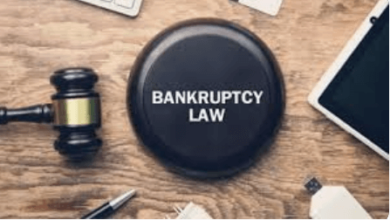Finding Financial Freedom: How a Bankruptcy Attorney Near Me Can Help

Are you trying to keep up your financial obligations? Does it seem to be like there is no end in sight for your debt woes? If so, you’re not alone. Many people find themselves drowning in bills and unable to make end meet. But the good news is that there is a solution: bankruptcy. While it may seem daunting, filing for bankruptcy can actually be a way to achieve financial freedom and put yourself back on track. And with the help of bankruptcy attorney near me, navigating this process can be much easier than you might think. Read to learn more about how a bankruptcy attorney can help you find the relief you need and deserve! Read more
What Is Bankruptcy attorney near me?
Bankruptcy attorney near me is a lawful process that allows individuals, businesses, and organizations to alleviate or repay their debts under the court supervision. It intended to provide relief for those who are unable to pay off their bond on their own. There are two main types of bankruptcy in Chapter 7 and Chapter 13. In Chapter 7 bankruptcy, certain assets may be sold off in order to pay back acceptor while in Chapter 13 bankruptcy, a payment plan is established over a period of three to five years. Filing for bankruptcy can have an impact to your credit score and financial future. However, it can also offer a fresh start by wiping out most or all of your unsecured debt. It important to note that not all debts can be discharged through bankruptcy. For example, student loans and certain tax debts cannot be alleviate through this process. The decision whether or not to file for bankruptcy is a complex one that requires careful consideration. A qualified attorney can help you understand your options and make the best decision for your individual circumstances. Read more
Types of Bankruptcy
When people think about bankruptcy, they often think of one kind. However, there are actually several types of bankruptcy that individuals and businesses can file for. Here are the main ones: Chapter 7 Bankruptcy: This is also known as liquidation bankruptcy. It involves the selling off of assets to pay creditors. Most unsecured debts can be discharged with Chapter 7.Chapter 11 Bankruptcy: This type of bankruptcy is mainly used by businesses or corporations who want to restructure their debt but continue operations. Chapter 13 Bankruptcy: This option allows individuals with a regular income to create a payment plan end three to five years in order to repay all or part of their debts. Each type has different eligibility requirement and consequence, so it’ important to speak with a qualified attorney before deciding which one is right for you. Read more
How a Bankruptcy Attorney Can Help
A bankruptcy attorney is a lawful professional who specializes in helping individuals and businesses that are facing financial challenges. When you’re struggling with debt, a bankruptcy attorney near you can help and guide you through the complex process of filing for bankruptcy. One of the primary way that a bankruptcy lawyer can assist you is by providing expert advice on which type of bankruptcy to file for. There are several different types of bankruptcies, including Chapter 7 and Chapter 13, each with their own unique advantages and disadvantages. In addition to helping you choose the right type of bankruptcy, your attorney will also prepare all necessary paperwork and represent you in court throughout the entire process. This includes attending meetings with creditors and ensuring that all necessary deadlines are met. Another key benefit of working with an experienced bankruptcy lawyer is gaining access to their extensive knowledge about local laws and ordinance related to debt relief. They can help ensure that your rights are protected throughout every stage of the process. Hiring a knowledgeable and skilled bankruptcy attorney can make sure all the difference when it comes to finding financial freedom from overwhelming debt. Read more
The Pros and Cons of Bankruptcy
Bankruptcy is a legal process that can help individuals and businesses eliminate or repay their debts under the protection of the bankruptcy court. While it can be an effectively solution for people who are struggling financially, it also has its downsides. One of the pros of bankruptcy is that it stops creditor harassment. Once you file for bankruptcy, creditors must stop all collections efforts against you, including phone calls, letters, and lawsuits. Bankruptcy can also prevent foreclosure on your home or repossession of your car. Another advantage is that bankruptcy can give you a fresh start by wiping out most unsecured debts such as credit card balances and medical bills. This means that you’ll have more money to pay for your basic needs and living expenses. On the other side, there are some cons to consider before filing for bankruptcy. One downside is that it stay on your credit report for up to 10 year which could make getting approved for loans and credit cards more difficult in the future. Moreover, not all types of debt can be discharged through bankruptcy such as student loans or child support payments which may still need to be paid off after filing. Additionally, hiring a lawyer to assist with your case comes with fees which might add up quickly. It important to weigh these pros and cons carefully before deciding if filing for bankruptcy is right for you. It’s always recommended seeking advice from professionals like experienced financial advisors or attorneys who specialize in this area so they could help explain everything clearly while helping decide whether this path suits best given one’s situation
What to Do if You Are Considering Bankruptcy
If you are struggling with over whelming debt and considering bankruptcy, it is essential to know what steps to take. The first step is to consult with a qualified bankruptcy attorney near you who can advise you on your legal options. Your attorney will review your financial situation and help determine whether bankruptcy is the right choice for you. They may be recommend either Chapter 7 or Chapter 13 bankruptcy depending on your circumstances. You are must complete credit counseling from an approved agency within 180 days period to filing. Your attorney will be provide a list of approved agencies in your area. You will also need to gather all necessary documentation such as tax returns, pay stubs, bank statements, and bills. This information will be used in preparing your bankruptcy petition. It is important to unclose all of your assets and debts accurately and honestly in order for the process to go smoothly. Your attorney can guide you through this process and ensure that everything is filed correctly. By accept these steps and working closely with a knowledgeable bankruptcy attorney, you can begin the path towards financial freedom.
Conclusion
Bankruptcy can be a complicated and emotionally challenging process, but with the help of an experienced bankruptcy attorney near you, it is possible to find financial freedom. By understanding the different types of bankruptcy available and evaluating the pros and cons you can make an informed decision about whether or not this is the right path for you. Remember that while bankruptcy may seem like a daunting option, it can also provide much-needed relief from overwhelming debt and give you a fresh start towards building a more secure financial future. If you are considering filing for bankruptcy, take the time to research local attorneys who specialize in this area of law. Schedule consultations with several lawyers before making your decision so that you feel confident in choosing someone who will supporter for your best interests throughout the process. With guidance from a trusted bankruptcy attorney near me, you can navigate this difficult time with greater ease and ultimately emerge on solid ground once again.



